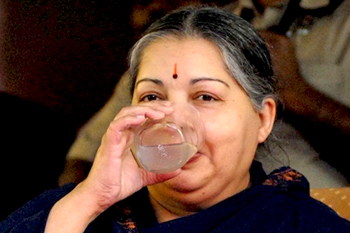New Delhi, Oct 17: In a major relief to jailed AIADMK chief J Jayalalithaa, the Supreme Court today granted her bail in a disproportionate assets case in which she was sentenced to four-year jail term.
 A bench headed by Chief Justice H L Dattu stayed the sentence and warned Jayalalithaa against causing any delay by seeking adjournment in her appeal in Karnataka High Court.
A bench headed by Chief Justice H L Dattu stayed the sentence and warned Jayalalithaa against causing any delay by seeking adjournment in her appeal in Karnataka High Court.
The bench directed Jayalalithaa to file paperbook of her appeal in the high court within two months.
"If paperbook is not filed within two months, then we won't give you even a single day more," the bench said.
It refused to dispose of the bail plea and posted the case for hearing on December 18 to ensure that Jayalalithaa complies with its order.
The bench also said that it would ask the high court to dispose of her appeal within three months.
In an hour-long hearing, initially the bench expressed reservation on granting bail to her, saying she had delayed the trial proceedings for years and if she is allowed to come out on bail then appeal would be decided in two decades.
Senior advocate Fali S Nariman,appearing for Jayalalithaa, assured the court that the matter would not be delayed, saying that he was willing to give the statement on affidavit that no adjournment would be taken by her in the high court.
"I undertake that no delay would be caused while appeal is heard by high court. It is not a game. It may have been a game before. You can record my statement," Nariman told the bench.
The apex court also granted bail to Jayalalithaa's close aide Sasikala and her relatives V N Sudhakaran, disowned foster-son of the former Chief Minister, and Ilavarasi.






Comments
Add new comment